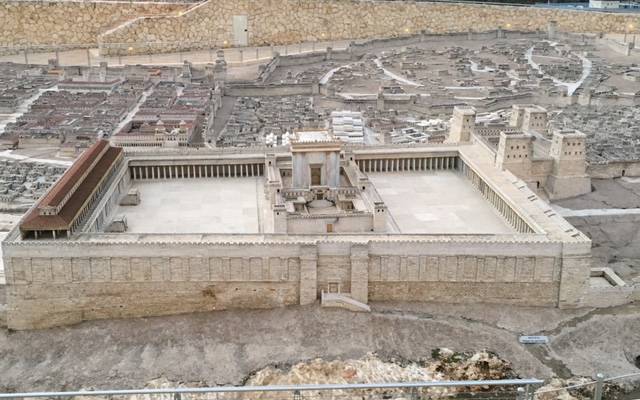What is one of the most interesting sites in Jerusalem that is also comfortable for all weather, all ages and walking abilities? The Israel Museum!
The Israel Museum was first established in 1965, and after major renovations, during which it was closed for three years, it re-opened in 2010 as the world leader in Biblical archaeology from the Land of Israel, eighth in the world in international art, the home of the Dead Sea Scrolls and the remarkable model of Jerusalem just before its destruction in ancient times by the Romans. The museum displays almost 500,000 objects in their regular exhibits, as well as fascinating special exhibits.
The story is told that Teddy Kollek, who developed many areas of Jerusalem as mayor of Jerusalem from 1965 to 1993, asked some Jewish art collectors for a donation of a few pieces in the 1960s. They told him that they would be happy to make a donation, but that Jerusalem doesn’t have a proper place to display them. With great vision, and strength to go against opposition to the idea due to the difficult financial and security situation of the State of Israel in those years, Kollek set about establishing a museum in which important pieces of art, archeology, Judaica and more could be properly displayed.
The museum was established, it was not built all at once. Rather, it was built in a “campus” format over many years over 20 acres of land in the Government Quarter of Jerusalem, in which the Knesset (Israeli Parliament), Supreme Court, Prime Minister’s Office and other government offices, as well as other museums and a bird sanctuary, are located.
There is something worthwhile to see in the Israel Museum, wherever you look. Even in the courtyard leading to the more famous wings, visitors will be amazed to see original pieces from ancient synagogues in the Galilee. They are decorated with menorahs and other typical Jewish designs, and testify to a strong presence of Jewish people in the Land of Israel for hundreds of years following the destruction of the Holy Temple in Jerusalem in 70 CE.
Walking through the museum’s Archaeology Wing is like walking the Tanach (Hebrew Bible). You will see the material culture and paganism that Abraham and Sara opposed, artifacts from Hazor and other cities that were conquered by Joshua, royal artifacts from the First Temple Period, clay seals (bullae) from the time of Jeremiah, the oldest Hebrew Biblical inscription (the Priestly/Aaronic Blessing), artifacts from the time of Hezekiah and the Assyrian’s attacks on the Land of Israel, anchors from the Dead Sea from the time of the Hasmonean (“Maccabee”) Dynasty, ancient Jewish coins, Herod’s sarcophagus (coffin), artifacts and inscriptions from the time of the 2nd Holy Temple and much more.
The Jewish Life and Art Wing is a wonderful look into Jewish life, Judaica, and several beautiful synagogues that have been re-located from Germany, Italy, India and Suriname to the Museum for preservation as the Jewish people return home from the four corners of the Earth, and are less in need of synagogues in the Diaspora.
The Art Wing is encyclopedic – showing art of many time periods and styles from around the world. Many visitors are most interested to see the artwork of Impressionists or Post-Impressionists such as Monet, Renoir, Pissaro (a Jewish Impressionist artist) and Van Gogh. Others are drawn to see the current special exhibit of Picasso’s works. It’s interesting to note that pieces were acquired through donations to the museum from Jews and friends of Israel around the world, acquisitions of the museum focusing on Israeli art work, and pieces that were recovered from the Holocaust. The Museum has several pieces on display hoping that the rightful owner will recover the artwork that had been stolen by the Nazis and no one knew who to return them to after the War.
Of course, visitors will want to see the Shrine of the Book, which houses the Dead Sea Scrolls (representing over 850 different manuscripts including all of the Hebrew Bible except the Book of Esther as well as other books from ancient times). The building also displays amazing artifacts from the Essenes, the Jewish community that seemed to ha,ve written many and stored the scrolls in caves in and near Qumran, such as an ink well presumably used to write some of the manuscripts and items they used in their everyday communal life, such as dishes. On the lower level is the Allepo Codex, the oldest book version of the Hebrew Bible including punctuation and cantillation marks, with the story of its amazing journey from Tiberias in the 10th century to Egypt, to Allepo, Syria and back home to Israel in modern times.
No visit to the Israel Museum would be complete without seeing the Model of Jerusalem just before its destruction in 70 by the Romans. The model is remarkably accurate, considering it was built in the 1960s (in memory of a soldier who fell fighting for Jerusalem), when Jordan was occupying the Old City of Jerusalem and there hadn’t yet been the many archaeological excavations that have been done since 1967, when Jerusalem was unified during the Six Day War. It’s exciting to stand above the model, as if one is standing on the Mount of Olives, to look down on the Temple Mount and identify places in the City that we can visit today.
(Note: It’s possible to request a museum chair/walking stick at the coat check room for those who have difficulty standing for long periods of time. The museum offers free tours throughout the week as well as a free audio tour which visitors can use to go at their own pace.)
By: Leah Bowman
(The author, a licensed tour guide, leads inspiring tours throughout Israel, including child-friendly and bible tours. Check out her website and blog page.)

Sign the Declaration to Keep Jerusalem United
Jerusalem Must Remain the United Capital of Israel
I declare that Jerusalem is the eternal capital of the Jewish People and support all efforts to maintain and strengthen a united Jerusalem as the undivided capital of the State of Israel.
See our Privacy Policy